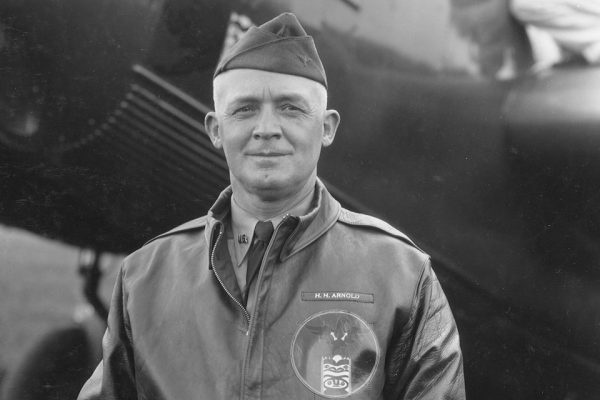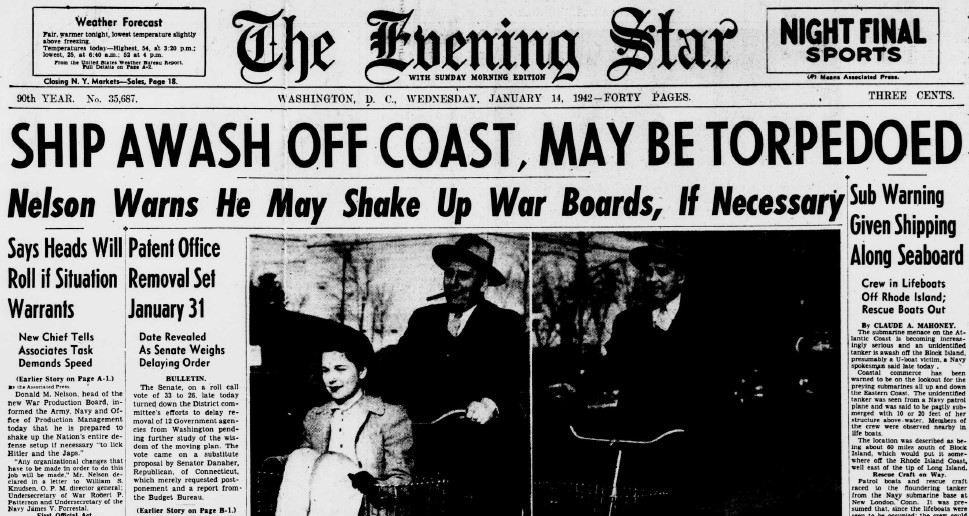World War II Chronicle: January 14, 1942
Click here for TODAY’S NEWSPAPER
Heroes and Scapegoats

Col. H.C. Kress Muhlenberg, the former commander of Hickam Field, gave a speech last month denouncing the Lend-Lease policy of sending new planes abroad instead of upgrading our fleet of deficient aircraft. He will now be court-martialed.
Some officers, like Col. Muhlenberg and Gen. Hap Arnold staunchly opposed Lend-Lease. Understandably so. While we can dispassionately analyze the war, they commanded the men that would die as a result of Washington’s policies. They would also have to execution a war made more difficult with fewer planes, tanks, and trucks.
Or would it?
Human beings are storytellers by nature and every story needs a hero and a villain. We quickly elevated heroes like Lt. Colin Kelly, and the Marine defenders on Wake, but there is also a primal desire to find scapegoats. Americans would prefer to think that the attack on Pearl Harbor was so devastating because some general or admiral having screwed things up. The Roosevelt administration may have wanted to make sure the public’s attention didn’t fall on them either. Generals and admirals are easily replaced, but a loss of trust in the president at this stage of the war would be very harmful.
It is more comfortable to think that December 7 happened because we goofed up and not because our enemy was just that bold and effective. There were things we could have done differently, but those things could have caused things to go worse. If our flight lines were packed with new P-40 Warhawk and F4F Wildcat fighters at Pearl Harbor and in the Philippines, they would have been destroyed just the same as the older models.
It would be easy to sit here 80 years later and debate whether or not Hap Arnold and Col. Muhlenberg were wrong, but that is only because we have hindsight. Roughly one-fifth of our economy went to Lend-Lease aid. Yes, that meant that at a time we had planes that were seriously outmatched by the Japanese defending our bases, thousands of newer planes were going to our allies. But think ahead for a moment: sending our warplanes overseas compressed the time it took to develop the world’s most effective warplanes. Instead of stockpiling tens of thousands of 1941-model fighters and preparing for an invasion many months away, those planes went into action right away. While we prepared for war, our planes were already experiencing combat, which exposed design flaws and showed certain platforms to be ineffective. Modifications were made to existing planes and inferior models were scrapped, meaning we had far better planes once our pilots were in the fight.
Had Arnold and Muhlenberg got their way (that is, if they wanted no aid) then it would have been American pilots and crew learning hard lessons, gunned down by German pilots that otherwise could have been killed by Red Army or Royal Air Force pilots.
It is quite staggering though to consider the amount of aid we sent to our allies. In addition to 14,000 planes, we sent the Soviets
- 400,000 jeeps & trucks
- 8,000 tractors
- 13,000 tanks
- 1.5 million blankets
- 15 million pairs of army boots
- 107,000 tons of cotton
- 2.7 million tons of petrol products
- 4.5 million tons of food
That’s $11.3 billion worth of aid — over $182 billion in 2021 dollars.1 We sent the British three times that amount.
Looking at the promotion list on page 3 we find several future stars moving up in ranks. Col. Robert Olds, a World War I veteran aviator, former aide to Gen. Billy Mitchell, and advocate for strategic bombing and an independent Air Force branch, will pin on his first star.
His son Robert Jr. — better known as “Robin” — is a cadet captain at the U.S. Military Academy in 1942. Just a week before Pearl Harbor, Robin was part of the squad that lost to Annapolis in the Army-Navy game, but this season he will be named the top lineman in the country, and renowned sportswriter Grantland Rice dubs him “Player of the Year.”
Disappointed by the pettiness at West Point, Robin scorned the practice of “ring knocking,” where service academy graduates enjoyed advancement and other preferential treatment over other soldiers and sailors. He became the only pilot to make ace in both a P-38 Lightning and a P-51 Mustang. Olds briefly served as an assistant coach for West Point’s football team before the Vietnam War and after his legendary time as commander of the 8th Tactical Fighter Wing, he was named Commandant of the Air Force Academy. After his time at Colorado Springs, the triple ace became an inspector and warned the USAF that their combat doctrine and training program left fighter pilots dreadfully unprepared for dogfights. Once North Vietnamese fighters began shooting down Air Force pilots on a 1:1 basis during Operation LINEBACKER, Olds volunteered to drop back to colonel so he could return to Southeast Asia as a commander where he could correct the issue. The Pentagon refused, so Olds retired in 1973. In 1985 he was named to the college football hall of fame.
Col. Harry Schmidt, an old China Marine and veteran of the Cuban, Nicaraguan, and Mexican operations, is now a general officer, serving as an assistant to Marine Corps Commandant Thomas Holcomb. In 1943 Schmidt is picked to command the 4th Marine Division, then leads the Fifth Amphibious Corps, overseeing Marines during the Battle of Iwo Jima.
William H. Rupertus, another China Marine who penned the now-famous “Rifleman’s Creed” (This is my rifle. There are many like it, but this one is mine…) after the Pearl Harbor attacks, is now a brigadier general. Rupertus will join 1st Marine Division, serving as Maj. Gen. Alexander A. Vandegrift’s assistant division commander.
Also among this month’s promotions is Col. Matthew B. Ridgway, who becomes Maj. Gen. Omar Bradley’s assistant commander. Bradley’s 82d Infantry Division has been chosen to become one of the United States Army’s five airborne divisions. Ridgway will take the reigns of the renamed 82d Airborne Division in August and will lead the outfit until just after the Normandy Invasion, when he is picked to head the XVIII Airborne Corps.
After the surrender of Nazi Germany, Ridgway’s next assignment was working with his old boss Gen. Douglas MacArthur (the two served together in the Philippines), at the end of World War II. Ridgway is best known for his exemplary leadership during the Korean War: taking over the Eighth Army after the death of Gen. Walton Walker in 1950, then taking command of all UN forces once President Harry Truman sacked MacArthur.
Speaking of MacArthur, Phillies manager John “Hans” Lobert (page 16) recalls MacArthur’s time on the West Point baseball team. MacArthur was reportedly approached to become the Commissioner of Major League Baseball in 1951, but he turned it down. Another famous World War II general played baseball: Dwight Eisenhower. In 1911, Eisenhower played (under the name of Wilson) for the Junction City Soldiers before joining the U.S. Military Academy.
1: according to inflationcalculator.com, converting 1943 dollars to 2021 dollars
